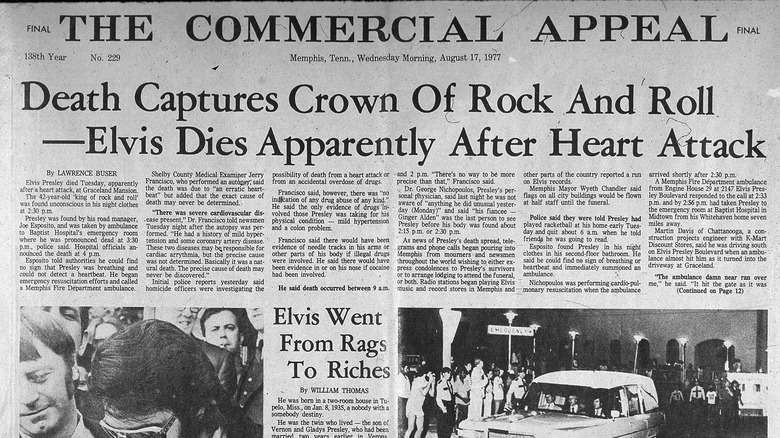What We Learned About Elvis Presley's Health After His Death
"Before Elvis, there was nothing," John Lennon once said of Elvis Presley (via Far Out). The musical sensation shocked and mesmerized with his style, charm, and performative energy. Fans couldn't help falling in love with his songs and on-stage persona. Over the course of his career, the Tupelo-born singer had 108 Billboard Hot 100 hits and topped the charts for 67 weeks, a clear testament to the devotion of his fans. By the time of his death at the age of 42, Presley had become one of the most famous musicians worldwide.
The rock star's death on August 16, 1977 was said to have been caused by heart failure (via People). But the picture is complicated by information that has come to light about other factors that may have impacted Presley's health, and possibly contributed to his early demise. In the years since that fateful day at Graceland, what have we learned about the death of Elvis Presley?
Elvis Presley's father authorized to seal the autopsy report
Elvis Presley's death was a shock to many. Robert Hilburn, then a pop music critic with the Los Angeles Times, told Variety that "it was like a member of the family died... That's what struck me, the depth of the emotion. It was a local boy -– he didn't move to New York or L.A. He had a house out here, but he lived in Graceland, he lived in Memphis, he stayed in his hometown." Any news on Presley's cause of death was bound to make the front page.
A few days following the death, Tennessee's Chief Medical Examiner Jerry Francisco issued a death certificate listing coronary problems as the cause of death (via People). However, widespread rumors of Presley's drug use led many to believe that the official line was hiding the truth. Further fueling the speculation was the fact that the singer's father, Vernon Presley, had the autopsy sealed until 2027 — only to be opened on the 50th anniversary of Elvis's death (via Express). This secrecy invited the curiosity of conspiracy theorists, along with legal action from journalists. According to a 1982 article from The New York Times, the Tennessee supreme court dismissed a petition by ABC News program "20-20" to force Shelby County's medical examiner to make Presley's autopsy report public.
Elvis Presley abused prescription drugs
Despite the medical examiner's official ruling, accounts from Elvis Presley's family and friends suggest rampant drug use that may have contributed to his death. "I have never seen a human being in my life abuse drugs like Elvis," the singer's stepbrother David Stanley told People in 1980, adding, "I am not talking about street drugs — I am talking about prescribed drugs. Some of the doctors were out for the almighty buck." Other reports from members of Presley's inner circle, the so-called "Memphis Maphia," were much the same. The singer had required hospitalization for overdoses at least twice prior to his death, and in their final examination at least one of the autopsy team wanted to attribute cause of death to a lethal cocktail of drugs. In the years following, charges were brought up against Presley's personal physician, Dr. Nichopoulos (via Practical Pain Management), who'd prescribed copious amounts of drugs to the singer in the months leading up to his death.
Elvis Presley's heart was double its normal size
It was the defense team of Elvis Presley's personal physician that unveiled more of the singer's underlying health problems. In 1981, Dr. George Nichopoulos was indicted for over-prescribing medication to the singer. He was acquitted at trial, in part due to the testimony of Dr. Forest Tennant, a witness for the defense (via Practical Pain Management). According to Tennant, Presley had been suffering from heart and cardiovascular disease, and though he'd been undergoing treatment for hypertension, his doctors did not know that his heart was double the standard size. Presley also had atherosclerosis in his aorta, cerebral arteries, and coronary vessels.
Presley's combined use of laxatives and opiates — which can cause digestive backups — also indicate that he was suffering from chronic constipation, which combined with his heart problems may have spelled the end: at the time of his death he was attempting to move his bowels, which could have put undue pressure on the already strained heart and aorta, causing a heart attack (via PBS).
Elvis Presley had underlying medical conditions
Decades later, the mystery around Presley's death still looms, and speculation continues. New research suggests that the rock star was always struggling with his health, and may have been since birth.
Sally A. Hoedel, an Elvis-fan, historian, and businesswoman, wrote "Elvis: Destined to Die, Young," which presents an alternate theory of Presley's death. In a conversation with Express, the author revealed her belief that the singer had a toxic megacolon, which may have developed due to congenital factors that led Presley to have digestive problems all his life. This rare condition is caused by complications due to a disease or infection in the colon, and can be deadly if left untreated (via Johns Hopkins Medicine). Hoedel also said that Presley was a carrier of alpha 1 antitrypsin deficiency (via Express), a genetic disease that can contribute to lung problems even in someone who carries only one gene (per British Lung Foundation).
Hoedel sees Presley's abuse of prescription medication as a result of his lifelong health issues. "In terms of the medication, a lot of people look at Elvis and they see a situation of a man who is a story of self-destruction and I see a story of a futile struggle to survive," she told the Express.
Elvis Presley may have had an autoimmune disorder
Dr. Forest Tennant, the medical witness who testified in defense of Elvis Presley's physician back in 1981, also believes that modern medicine has more to tell us about the star's death. Combining Presley's original health records with modern medical research, Tennant has concluded that several documented head traumas Presley suffered through his life — most seriously, a fall in a bathroom in 1967 that knocked him out cold — led him to develop an autoimmune inflammatory disorder (via Practical Pain Management).
At the time of Presley's death in 1977, the connection between traumatic brain injuries (TBIs) and autoimmune conditions was not yet known, and this area is still a growing field of research. According to Dr. Datis Kharrazian, a leader in functional health education on the brain and autoimmune conditions, "When brain injury or impairment triggers an inflammatory response in the body, it's known as a 'brain-immune dysregulation disorder.' ... Researchers now understand the brain profoundly impacts the body's immune system. Compromised brain health can alter immune regulation and modulation (balancing) of inflammation throughout the entire body" (via Hope After Brain Injury). Tennant points out that later in his life, Presley exhibited a variety of symptoms that could all be traced to an autoimmune response: joint pain and rigidity that impacted his ability to perform, headaches, memory loss, and illogical behavior (via Practical Pain Management). TBIs can also lead to inflammation of the heart's arteries, and eventually, disorders in multiple body systems.
In the end, Elvis Presley's myriad health problems — stemming both from genetics and life events — coupled with his drug use and poor diet, may have created a perfect storm that led, ultimately, to the singer's early death.
Elvis Presley had glaucoma
In the song "That's Life," Frank Sinatra sings about how life can have sudden ups and downs. And this certainly was the case for Elvis Presley. In January of 1971, Presley received the national honor of One of the Ten Outstanding Young Men of the Nation by the United States Junior Chamber of Commerce (The Jaycees), per Graceland. Later that month and into February, he was performing at the International Hotel in Las Vegas. Then in March, he was forced to cancel a recording session when his eye became inflamed and painful because of secondary glaucoma.
According to Laser Care Eye Center, when a person develops glaucoma, their optic nerve becomes damaged by pressure in the eye. But while primary glaucoma typically occurs because fluids in the eye aren't draining properly, in secondary glaucoma this pressure build-up happens because of something outside of the eye. For example, being diabetic can sometimes lead to secondary glaucoma. So can using steroids or sustaining an eye injury. And if one's eye becomes inflamed, that too can result in this form of glaucoma.
While there are treatments for glaucoma, this is a serious eye disease that can jeopardize someone's vision, especially if it isn't treated (per Laser Care Eye Center). But Presley sought medical help at a hospital in Nashville for his glaucoma (via Graceland). By May of that same year, he was back to his recording sessions.
The genetic condition that may have caused Elvis Presley's emphysema
The words "deficiency" and "Elvis Presley" don't usually appear in the same sentence. After all, as a performer, Presley had an abundance of talent and stage presence. Even decades after his death, he's "The King" with fans around the world. But when it came to his health, Presley had a genetic condition called Alpha-1 antitrypsin deficiency (also known as AAT deficiency), via Practical Pain Management. And, unfortunately, AAT deficiency can lead to another of Elvis' health issues: emphysema.
According to MedlinePlus, Alpha-1 antitrypsin (AAT) is a protein produced by the liver, and it helps protect one's lungs. Sometimes, however, the liver makes the AAT proteins in the wrong shape. As a result, these proteins are unable to leave the liver and so never travel to the lungs, leaving them more vulnerable. Our lungs contain air sacs that are crucial for our breathing, but as the Mayo Clinic explains, emphysema occurs when these sacs become damaged. As a result, a person with emphysema can have difficulty both getting enough oxygen and exhaling.
Now, it's worth noting that someone might have AAT deficiency and not experience any symptoms or health issues (per MedlinePlus). And it's rare that AAT deficiency alone causes emphysema. But if a person does develop emphysema for any reason, if they have AAT deficiency, the odds go up that they'll have respiratory system problems like large holes in their lungs and even a collapsed lung, via Mayo Clinic. Additionally, someone with emphysema is more at risk of heart problems.
Elvis Presley once aspirated a tooth cap
Did you know that Elvis Presley arguably starred in the first music video, according to Graceland? It's the famous scene from his movie "Jailhouse Rock" when "The King" dances in a "jail" where the prisoners are allowed to slide down a pole and play musical instruments. However, a mishap during that scene could have cost Presley his voice.
During the performance, a cap on one of Presley's teeth broke off, and he aspirated it. To put it another way, have you ever accidentally inhaled while eating or drinking something, and your food or drink "went down the wrong pipe?" Well, a medical professional would say you aspirated your food or beverage, per WebMD. And, of course, when this happens, whatever is aspirated winds up in the person's lungs. Now, in cases where someone aspirates a sip of water, usually the person just coughs until they feel better. But that doesn't mean aspiration can't be dangerous, including potentially leading to infections and injury to the lungs.
In Presley's case, that aspirated tooth wasn't something he could just cough back up (per Graceland.com). Instead, he needed to go to the hospital where a doctor parted his vocal cords to remove the cap. Obviously, this could have damaged Presley's famous voice and possibly ended his singing career. Still, that tooth cap did impact Presley's legacy in one way. A throat injury for Presley's character was written into "Jailhouse Rock" because of this real-life incident.
Elvis Presley was found to have diabetes
On the day Elvis Presley died, his girlfriend, Ginger Alden, found him face-down on his bathroom floor, via Biography. In an attempt to save him, an ambulance transported him to Baptist Memorial Hospital. Later, the doctors there performed an autopsy, and some of their findings were that Presley was chronically constipated and diabetic.
As the Centers for Disease Control and Prevention (CDC) explains, when a person is diabetic, their body either doesn't use the insulin it produces properly or doesn't produce enough insulin. This results in their body's cells not being able to properly absorb sugar from food, which means higher amounts of sugar circulate throughout their body via the bloodstream. And this excess sugar can cause health problems like a type of nerve damage known as diabetic neuropathy that (depending on which nerve is affected) can cause constipation, via Medical News Today. Diet, as well as certain medications, can result in constipation and sometimes bloating. And it's worth noting that Presley also took opiates, which can cause severe constipation, according to PBS.
As History points out, the singer had gained quite a bit of weight in the last years of his life, which could also have been associated with his diabetes — indeed, according to a 2017 paper published in Circulation Research, people with type 2 diabetes are very likely to be carrying extra weight.










